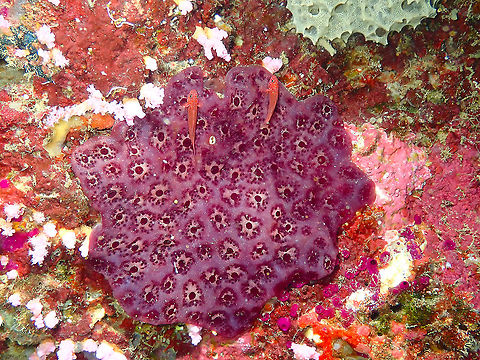
Appearance
This synascidia is in encrusting form. The common coat is thick, with hard consistency, purple in color, dark brown to blue-black. It is marked by circular depressions, with a series of small zoids surrounding a common cloacal siphon located in the center. Each zoid has its own mouth siphon, digestive system, reproductive system and heart. It secretes its own tunic, composed of tunicin, 60% cellulose, which is unique in the animal kingdom since cellulose is a compound specific to plants. Like sponges, it has spicules for identification. Max size 20 cm.Distribution
Indo-Pacific and Indian Ocean.Habitat
Depth 7-54 m. It is found on coral reefs developing on dead corals.Reproduction
It is hermaphrodite. Sexual reproduction, external fertilization and in the case of a common cloacal siphon, the fertilized eggs are kept in an incubator pocket in the cloacal cavity, from where the larvae will be expelled from the colony. They are planktonic, free swimming, before settling and developing on the substrate. Asexual reproduction by budding.Food
It feeds on planktonic microorganisms by filtration.References:
Some text fragments are auto parsed from Wikipedia.
https://nomadica.jimdofree.com/tuniciers/ascidies/eudistoma-reginum/http://www.marinespecies.org/aphia.php?p=taxdetails&id=250248
https://commons.wikimedia.org/wiki/File:Purple_Ascidian_(Eudistoma_reginum)_(8478477354).jpg